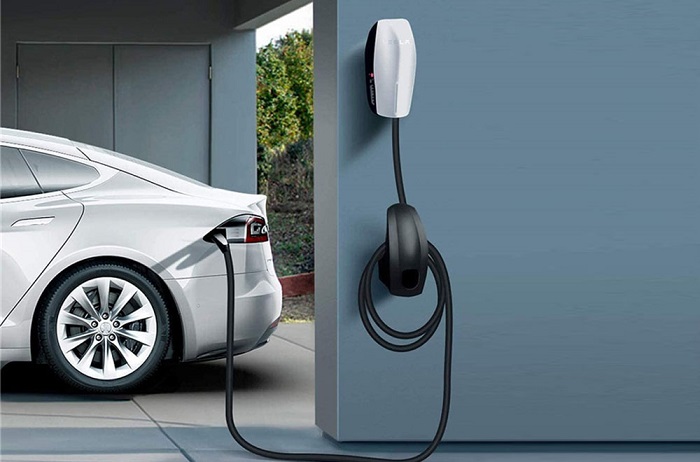Installing an electric vehicle (EV) charger at home can enhance convenience for Tesla owners, allowing them to charge their car overnight while parked in the driveway or garage. Several Tesla EV chargers, including Tesla mobile and wall connectors, can be used in residential homes. Here are some of the EV charging options you can choose from:
Tesla Mobile Connectors
Tesla Mobile Connectors are specifically designed for Tesla EVs. These Tesla EV chargers are compatible with standard 120-volt outlets found in many homes, making them an appropriate option for home charging. By using the Tesla Mobile Connector, you can avoid installing a wall connector or a 240-volt outlet. You can plug the charging cord into a standard electrical outlet without needing an electrician.
Tesla Mobile Connectors are portable, offering additional convenience for charging on the go. This charging option is typically slower than other alternatives, with fewer charged miles per hour. You may increase the speed of the Tesla Mobile Connector by getting a NEMA adapter. This adapter can be plugged into a NEMA 14-50 outlet of 240 volts, providing increased energy for a faster charge.
Tesla Wall Connectors
The Tesla Wall Connector can be a convenient home charging solution for various Tesla EV models. This charger is relatively fast and compatible with a 240-volt power supply. It is typically hardwired into the home’s electrical system and can be installed both indoors and outdoors. If your house doesn’t already have the proper outlet available, you can work with an electrician to install a power source of 240 volts for the EV charger. A full charge can typically be completed in six to ten hours.
Level 1 Chargers
You can use Level 1 chargers by plugging them into your standard 120-volt AC outlet at home. Because Level 1 chargers are already compatible with standard electrical outlets, you can avoid modifying the wiring at your home. Level 1 chargers can work for most electric cars, though Tesla EVs may require an adapter.
Level 1 chargers are the slowest home charging option, taking approximately 24-36 hours to complete a full charge. This can make them suitable for overnight charging at home when a higher charging speed is not required. Consider using a Level 1 charger if you work from home and don’t need to drive long distances each day.
Level 2 Chargers
Level 2 EV chargers have a higher amperage, providing faster home charging per hour. These chargers often use a NEMA 14-50 plug. You may need to consult an electrician to set up a 240-volt power outlet in your home to accommodate the charger. Your electrician can help make sure your circuit supports the increased amperage.
You can install a Level 2 charger in your garage or another convenient, weather-protected area. Some Level 2 chargers provide features to monitor the charging session remotely, allowing EV owners to check the battery status and set a charging schedule. If the charger is not specifically made for Tesla EVs, it may require an adapter to fit the Tesla charging port.
Explore Tesla EV Chargers Today
With a home charging setup, you have the flexibility to charge your Tesla at any time that suits your schedule. This is beneficial for those with unpredictable or changing daily routines. You can choose a Tesla Mobile Connector, Wall Connector, Level 1, or Level 2 EV charger for charging at home. Each charger can provide a different charging speed to meet your needs. When choosing your EV charger, verify that the cable matches your vehicle’s charging port or has a suitable adapter. Consider installing a Tesla EV charger in your home today for enhanced convenience, flexibility, and accessibility.



